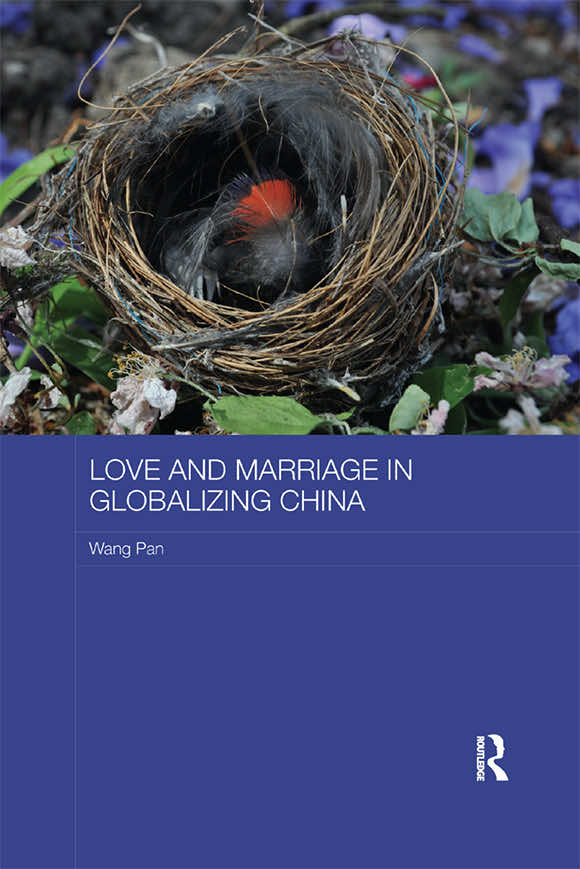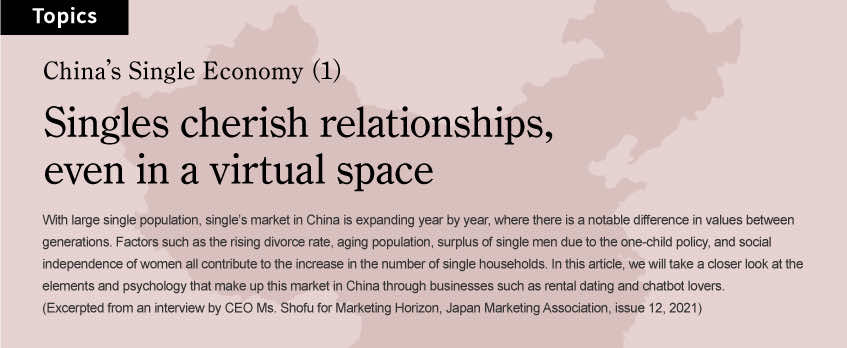
Dr. Pan Wang
Dr. Pan Wang is Senior Lecturer in Chinese and Asian Studies, University of New South Wales. She is author of Love and Marriage in Globalizing China (2015, Routledge). She teaches and researches in the areas of gender, love and marriage in China and Chinese media and communication. Her recent publications include “Going solo: An analysis of China’s ‘single economy’ through the date-renting industry” (2021), Asian Studies Review, pp.1–18; “Love in China” (2020) in Elisabeth Vanderheiden and Claude-Hélène Mayer (eds), International Handbook of Love: Transcultural and Transdisciplinary Perspectives, Switzerland: Springer Nature, pp. 955–973; and “Chinese-International intimate relations: An Australian case study of migrant marriage and divorce” (2020), Journal of Sociology, pp.1–18 (with Elaine Jeffreys).
Singles’ paradox
Shofu : Dr. Pan Wang, I came across your article “Going Solo: An Analysis of China’s “Single Economy” through the Date-renting Industry” and would like to have your view on this Single Economy in China. Firstly, may I ask what brought you to study this gender, love, marriage area?
Wang : My PhD project was on international marriages in China. I have been teaching and researching in the area of gender, love and marriage for a couple of years since I obtained the doctorate. I observed new dynamics and the dramatic changes happened in this area in recent decades, driven by legal changes, economic development and technological advancement. I found this fascinating and want to dive deeper in this area.
Shofu : I would address this interview from the socio-cultural and psychological point of view. How single’s economy impact in the Chinese society, or even an economy or country as a whole. You mentioned that the single’s economy changed the dynamics of the Chinese industry or society. How do you analyze the single’s economy shapes social or personal relationship in China?
Wang : China is witnessing growing development of products and services that is targeting singles, for example, the mini apartment for solo dwellers developed by real estate agencies, the mini fridges and coffee machines, hand-size kettles and cookers developed by electronic companies, one-person dining experiences developed by restaurants, which are quite similar to Japan’s single-oriented businesses. And the tailored tourist package for singles developed by tourism agencies, and the various dating apps and websites that are being developed and enhanced by AI technologies.
All of these are facilitating the growth of a single culture centered on single lifestyles. This enabled single adults to have a happy life, very satisfying lifestyle, and they will not feel lonely. Therefore, they do not really have to look for a partner or get married. potentially more people may choose to postpone their marriages , some may not enter a marriage or choose not to have children. This is how I see personal relations, social relations, and intimate relations have been shaped by the rising single economy in China.
Shofu : That is a very interesting trend because from foreigner’s point of view, traditionally Chinese embrace the family relationship, the gathering, in particular such occasion as the National Day, the Chinese New Year. However, you say that the single can enjoy a happy life. What is the psychological background behind this “It’s OK to be single” mentality?
Wang : It is more of the impact on social and personal relations I would say, rather than the psychological aspect. From the psychological aspect, I think single’s economy could lead to a growing mentality around single lifestyles, because of the increasing products and services that are targeting and serving the needs and wants of singles. That means people are satisfied with a single lifestyle , in other words, the products and services developed for singles make them less lonely.
You see the paradox here. On the one hand, you see the products and services that is serving the needs of singles, and wanting them to feel less lonely, and make them happy, satisfying. But on the other hand, because of the development of products and services, satisfying their needs, that will likey make China a lonelier nation.
Some interesting thoughts here about the psychological aspect, China’s single’s economy, I want to emphasize the impact on social and personal relations.
On the positive side, we do see single economy provides opportunities for singles to look for partners, companions, and develop ways to satisfy their needs for example, date-renting service helped to address the problem of loneliness.
And on the flip side, there are concerns. You do see some issues and problems around this kind of practice, like fake marriage, deception, prostitution, whichare illegal in China. There are other ethical concerns as well.
Date renting service gives flexibility to relationship
Shofu : Now you happen to mention the Date renting which is also the subject of your recent article, could you briefly introduce the key insights in this study?
Wang : Yes. Date renting has been growing popular among Chinese youth since the early 2010s. It started with a small number of bachelors, single males on social media, these single males wanted to rent a woman as their girlfriends and bring them home during the Lunar New Year gathering.
people at marriageable age tend to be questioned by their parents and relatives, if and when, would they have a partner, or are getting married. Marriage is a very strong institution. Date-renting has since evolved into a business targeting the needs of both single men and women. Which included both girlfriend renting, and boyfriend renting.
You could see the emergence of date renting websites, date hiring apps, and date renting platforms on social media, and also date renting events in public venues. To spot some of the key features on China's date renting website, the first one is the Chinese youths predominantly in their 20s and 30s, with a few are in their 40s. These group of people constitute the major players in the platform, and most people have adopted strategic ways to market and promote themselves to attract potential clients and romantic partners. It could be gendered in this aspect as well. I will not go into greater details. overall, date renting is a gendered and personalized service
The second feature is that date renting market constitutes diverse and hybrid motivations. for instance you can see some users intend to make money by renting themselves out. Some look for people who could perform their dates in front of their family and friends. some look for friends. Some look for real dates or authentic relationships, and some seek to heal their wound, some want to fill the void, and others are looking for a mixture of different types of relationships.
Third, date renting has a very fluid nature, young people trade their girlfriend or boyfriend experiences as a commodity in the digital market. In this market, people's relationship could be maintained as an economic relation or be converted into friendship, different kinds of relationships can be observed and they be converted into one another.
Also, the pricing is pretty flexible. Some people will say, “I can offer the service for free.” Others will say, “it depends.” the amount of money really is subject to the date offers, and who are willing to take that. Also, interestingly, girls tend to display a stronger tendency to charge a higher fee for their services compared to boys. many male charge a small fee or express willingness just to do the job for free. So there is some gender differences as well. And users can certainly filter their results based on their occupation, educational qualification, contact detail, and the types of services offered by individuals.
Shofu : Very interesting. And I am curious on this gender differences. What is the difference in motivation between the male and the female?
Wang : I think the motivations are very similar. But It could be a reflection of the current skewed gender ratio in China, especially in the marriage market. We all know males are squeezed out from the local marriage market in China, because they outnumber their female counterparts.

Love and Marriage in Globalizing China - 1st Edition
Wang Pan - Rou (routledge.com)
Shofu : I am also curious about why they are attracted by using this platform versus looking for the real partner, because you mentioned that this platform can be built as a friendship network. But the original purpose of using this platform from user point of view is to have the fake or one-time partner, so that they can show off in public or in a party event, then from service provider point of view, is to earn economic benefit by renting dating. But do they still have some choices to look for a real partner, right?
Wang : Yes, they do have more options. there are dating websites, friends networking websites, and other options for individuals to meet up and date. As you see, there are a lot of flexibilities and fluidity around this platform. Many individuals may not intend to look for love or looking for a date, they may just give this a try and see if it works for them or not. This flexibility could give individuals a lot of autonomy and space to decide.
I think the number of people who would like to stay single accounts for a smaller proportion. Given the growing products and services that targeting their needs and wants and making them satisfied, some would be happy to stay single However, that’s not to say many do not want to or plan to look for partners.
Other than the unmarried. We also need to think about the divorced and the widowed,. Some of them choose not to remarry. Others, their partner died, they do not feel like looking for a partner, or they just cannot find an ideal partner. So yes, these are all three groups of population we all need to look into. The divorce rate is growing so fast. Especially, it exceeded the marriage rate from 2012. So, it is really fast.
The reason for the rising divorce rate could be the increasing number of deception or extramarital affairs. It could be the simplified registration procedures for divorce.
More diversified market in the future
Shofu : Right. We have been talking about single’s mindset and date renting services. In terms of the business trend targeting single economy, is there anything else that caught your eye?
Wang : I believe more business and industries will venture into the singles market. So, companies will explore the niche market to develop products and services that are tailored to the needs of different groups of singles, including the unmarried, divorced, widowed, and those who leave alone
You could probably expect the trend to be perhaps more technology based and more personalized and more financially viable. Because some of the services that you know that is satisfying singles needs at the moment, can be costly, but the trend overall, I think would be more financially viable. And I also believe single’s economy will grow bigger more popular, and more diverse.
I guess singe economy is more developed in Japan. If there is a chance I would really love to travel to Japan to have a look to see how the single economy there is developed and compared with China's,
Shofu : Some insights from Japan could be the elderly singles’ market. Growing number of elderly singles does not have a child who take care of them, due to the declining birth rate. That reflects their spending for tombstone and living funeral by themselves and those are growing market.
Wang : That is absolutely needed, death is really something significant that people need to seriously think about. The wealthy single elite are able to get everything prepared for their death, however, the poor cannot afford doing so. More social support to singles from the marginalized group are needed.
Shofu : From your point of view, how the single’s economy in China will develop in 5 years?
Wang : The market will be further segmented, and more diverse products and services will be developed, and more technology based, more personalized and more financially viable.
And perhaps will be more international collaborations, for example, China will follow the similar path of Japan’s. There are a lot of space for the enterprise companies to cultivate and collaborate on, to work for the common goal, to satisfy the growing number of singles.
technology-based services for singles may become more prevalent. For example, the AI chatbots for singles. A growing number of single males and females have installed AI Chatbots in their mobile phones and computers. This technology helped them to find their virtual partners and made them less lonely. AI technologies could be used to develop more diverse products and services that serve the needs of different groups of singles.
Shofu : Speaking of chatbot boyfriend or girlfriend, are those also on a uptrend right now?
Wang : Yes, of course. The AI chatbots for singles is a rapidly developing industry with huge potentials
Shofu : Thank you so much Pan Wang for very interesting insights.
Our Services
Rapidly providing most essential information for initial stage in business extension abroad, including local environment, business information, market information for individual industry. Industry information of the considered countries can be found here without spending hours and the need to contact multiple sources.

Contains reports on latest changes in indications and market trends from local news and articles in native languages. Additionally, approximately ten topics are picked up from hottest local articles and news within last six months for every category listed below.

Market Information on Specific Industries
Market Information
Report on perticular B2C market information on consumer products and services, including market size, growth rate, entrant companies, brand share, distribution channels, market price. Investigates precise details within each category to understand market trend and entrant company conditions.
Industry Information
Report on particular B2B market, service industry, including industry outlook, market size (producers price), product output, import/export, number of companies, industrial cost and profit margin, number of full time employees, and average wages.



